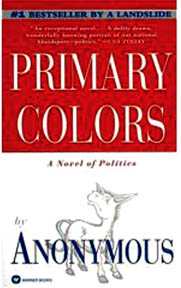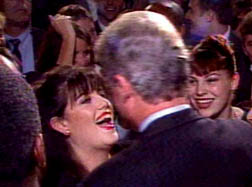|
observer |
|
|
|
|
|
OTHER LINKS |

|

|

|
True colours
Four years after Joe Klein anonymously published Primary Colours, the explosively bestselling roman a clef about the Clinton administration that was variously thought to be an attack on the President and a love letter to him, Klein found himself sitting in a hotel room in New York with the subject of his life. It was in 2000. Klein had first met the President in 1989, when Clinton was governor of Arkansas and almost immediately they spoke about, in Klein's phrase, 'ridiculously intimate things': the cocaine bust of Clinton's brother Roger; the Clintons' family therapy. Yet Klein was among the first to criticise Clinton; as early as 1994, he wrote a long article in Newsweek, 'The politics of promiscuity', about how Clinton's lack of sexual discipline had seeped into his policymaking. In Primary Colours, written two years later, the appetites of a thinly veiled candidate named Jack Stanton bore all the prescient hallmarks of the scandal that scarred the 42nd President. 'I guess there were people who felt that if it was real, it spoke ill of Clinton's character,' Klein says now. 'I didn't see it that way.' That day in the hotel room, Klein was interviewing Clinton for what would become a book called The Natural: The Misunderstood Presidency of Bill Clinton. Despite all that had passed between them, as Clinton was leaving office he spent more time with Klein than he did with any other journalist. On this particular occasion, they had spent two hours doing, in Klein's words, 'what almost passes for sex among wonks - talking about welfare and healthcare reform'.
Klein replied: 'Mr. President, I saw it as a tribute to larger-than-life politicians.' Hillary snorted derisively. 'First Lady,' Klein said, turning to her, 'Would you rather have a larger-than-life President or a smaller-than-life President?' She shrugged. Klein said: 'You know, larger-than-life politicians have larger-than-life strengths and larger-than-life weaknesses.' Hillary looked at Klein. She looked at her husband. She said: 'That's for sure.' Joe Klein tells this story over a sushi lunch around the corner from his office at Time magazine. He is a small, rounded man with an elfin laugh who has been, since his days as Washington correspondent for Rolling Stone, through his Newsweek years and his more recent stint at the New Yorker, possibly the most respected political reporter in America. When he approves of a politician, it is said that the pol has 'passed the Joe Klein primary'. Yet this feared figure is also unabashedly sentimental. He tends to judge novels by whether or not they are 'transcendent'; he once wept while watching nuns teach inner-city kids how to read. The next presidential campaign, in 2008, will be his ninth, but he is still crazily on the trail after all these years, waiting to be surprised, hoping to witness even the briefest moment of candid, fervent leadership in a sea of spin.
It would limit him. There's an innocence that's been totally lost.' Even the founding fathers would not have survived the barrage of data, Klein suggests. As one Republican consultant put it: 'Can you imagine sending Lincoln out with the Gettysburg Address in this atmosphere?' For a while, after Al Gore both won and lost the presidency in 2000, Klein thought he would retire from covering politics. But then 11 September happened and 'everything changed'. In the wealthy New York suburb where he lives, nine of his neighbours did not come home. At a local memorial service, one of the widows said to Klein: 'I have a small child and an infant and there are many others like me. You write about this stuff - when my kids grow up, how are you going to tell them what happened?' So Klein undertook to re-educate himself on the children's behalf. He had long been fascinated by the Jesus story ('because it's so unlikely - I mean: Godgets killed? How weird') but now he delved deeper into 1st- century Christianity and learned about Islam as well - all of which, he says, has been incredibly valuable at the beginning of 'what's likely to be a long religious war'. At the end of 2001 he went to Iran and wrote a story for the New Yorker, documenting a fleeting post-9/11 moment when Iran and the US were allies. He accepted his job at Time, writing a reported political column for what he considers to be the widest possible readership, and he made a new set of friends in the military, where he has, he tells me, 'met more impressive people in the last couple of years than any place else in this country'. For the past three years, Klein, who has always been against the war in Iraq, has had a running argument with his wife about whether he will go there. Twenty-two years ago, before setting off to cover the Contra war in Nicaragua, he wrote a will in the form of a letter to her, promising he would never go anywhere dangerous again. And Iraq is, he points out needlessly, very dangerous. After we meet, violence breaks out in Lebanon and I speak to Klein again on the phone. He has written a column pointing out that while the world's attention is fixed on Beirut, Iraq is on the brink of 'an all-out civil war between Sunnis and Shi'ites' that could spread to other countries. The death toll there is at least double the daily rate of casualties in Lebanon. This issue was raised last Thursday at a hearing before the Senate Armed Services Committee by two of the Pentagon's most senior generals, who said they had never seen sectarian violence as bad as that now taking place in Baghdad, and that this had not been anticipated. Donald Rumsfeld, who decided at the last minute to testify, failed to address the question of impending civil war, and stressed that US troops should not be withdrawn 'prematurely'. 'It was Rumsfeld at his most hilariously inappropriate,' Klein tells me. What's going on in Lebanon, he says, is 'a direct consequence of our stupid foreign policy in the region. I mean, we have empowered Iran. Hizbollah doesn't make the move to kidnap the soldiers without permission from Iran. I think that Bush has done a really remarkable thing,' he adds. (The Guardian) |
 At the height of the Clinton years, Primary Colours, his novel about
a US President caught in a sex scandal, caused a sensation. It turned
Joe Klein into a multi-millionaire and made him the world's most famous
political reporter. Here, he talks to Gaby Wood about his controversial
new book, his 'ridiculously intimate' relationship with the Clintons and
how he fell out of love with George W. Bush.
At the height of the Clinton years, Primary Colours, his novel about
a US President caught in a sex scandal, caused a sensation. It turned
Joe Klein into a multi-millionaire and made him the world's most famous
political reporter. Here, he talks to Gaby Wood about his controversial
new book, his 'ridiculously intimate' relationship with the Clintons and
how he fell out of love with George W. Bush.  They were both very relaxed, very happy. They opened a couple of Diet
Cokes. Hillary wandered into the room. 'So,' Clinton asked Klein, 'why
did you write that other book, anyway?' It was the first time he had
mentioned Primary Colours.
They were both very relaxed, very happy. They opened a couple of Diet
Cokes. Hillary wandered into the room. 'So,' Clinton asked Klein, 'why
did you write that other book, anyway?' It was the first time he had
mentioned Primary Colours.  Klein's new book, Politics Lost, opens with a stirringly dramatic
unscripted speech given by Bobby Kennedy on the death of Martin Luther
King. Klein jokes over lunch that, had he given that speech now, Kennedy
would 'know that 73 per cent of the African Methodist Episcopalians in
the audience were opposed to gay marriage, and 43 per cent of the
single-mother low-income workers thought that the income tax forms they
had to fill in were too complicated.
Klein's new book, Politics Lost, opens with a stirringly dramatic
unscripted speech given by Bobby Kennedy on the death of Martin Luther
King. Klein jokes over lunch that, had he given that speech now, Kennedy
would 'know that 73 per cent of the African Methodist Episcopalians in
the audience were opposed to gay marriage, and 43 per cent of the
single-mother low-income workers thought that the income tax forms they
had to fill in were too complicated. 







